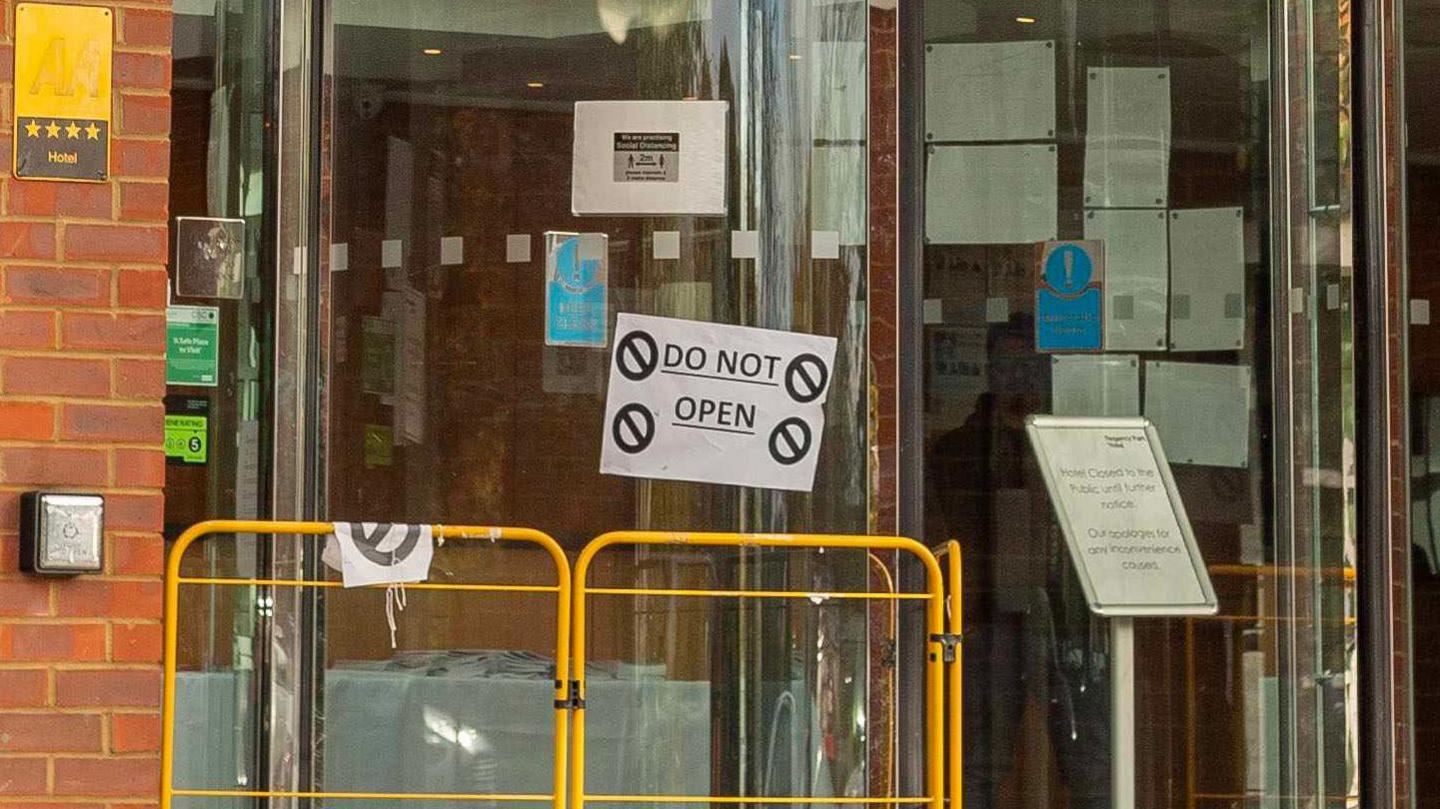Pre-Christmas refugee eviction branded 'heartless'

Volunteers in Thatcham and Newbury have been working with asylum seekers and refugees for the past two years
At a glance
A charity says more than 100 refugees and asylum seekers are being moved away from a community they have lived in for two years
The Home Office is ending its use of the Regency Park Hotel in Thatcham a week before Christmas
Volunteers supporting the residents said the decision was "cruel and heartless"
Some asylum seekers are being moved to the Bibby Stockholm barge
- Published
The decision to move more than 100 refugees and asylum seekers out of their community the week before Christmas has been branded "heartless" by charity volunteers.
People ordered to leave the Regency Park Hotel in Thatcham, Berkshire, by 15 December told the BBC they had spent the past two years settling into the area.
Volunteers from West Berkshire Action for Refugees (WBAR) said the move was "cruel" and that they would be missed "dearly".
The Home Office said it was part of its work to end the use of hotels, "which are costing UK taxpayers £8.2m a day".
Karen Reeves, lead volunteer for WBAR, said they had befriended the refugees and asylum seekers, and were able to learn their "real story rather than the political story".
"They don't have two heads, they're very real people with real issues," she said.

The hotel has become like a home for many of the asylum seekers
Ms Reeves said the people she worked with came to live in the hotel after fleeing places of corruption, persecution and war.
Fardin, an asylum seeker from Iran, said he "felt so alone" when he arrived in the UK but, with the support of the volunteers, the hotel became "like a big family".
He described Ms Reeves as "the mother of this family".
Daniel, an asylum seeker from Russia, explained that coming to the UK was "so difficult" as he did not know anyone or understand the culture.
He spent July to November feeling isolated in his hotel room.
But, with charity's help, he said he was able to make friends and navigate the application process for indefinite leave to remain.

Carmen was a doctor before she arrived in the UK
Carmen, a hotel resident who has recently been granted leave to remain, said she felt grateful for the "physical and mental support" she received since arriving in Thatcham.
She was a doctor in her home country but has not yet been able to convert her qualifications and so cannot practice in the UK.
"We've got teachers, a doctor, town planners", Ms Reeves said.
“They’re reliable and respectful and really highly motivated to work."
Charity volunteer Ian Freeland said: “A lot of people will think that they don’t bring an awful lot to the community but in fact what they’ve brought is huge.
"We're going to miss them like mad."

The charity set up a weekly event where residents cook each other dishes from their homelands
Volunteers have helped them to find alternative work and study towards qualifications recognised in the UK.
Ms Reeves highlighted the importance of education and integration as "they've spent two years sitting in a hotel with nothing to do".
One initiative the charity helped organise is Global Kitchen - a volunteer-run weekly social, where refugees and asylum seekers are able to cook and share dishes from their home countries.
With the support of the charity, residents of the hotel have been able to take food hygiene qualifications.
"For them, it's a way to share a meal with us and say thank you", Ms Reeves said.
At the hotel, cooking is not permitted and meals are provided through Home Office funding. The Home office has said all asylum seekers in hotels are provided with full board accommodation.
Volunteers at Global Kitchen criticised the lack of cooking facilities and said they felt it was important “to share a decent meal that doesn’t come from a takeaway container with a plastic knife and fork at the hotel”.
Carmen said her and the others at the hotel were "nostalgic about our home recipes."

Karen Reeves (right) has supported many refugees in her area, including Fatimah, who was recently housed
Many of the hotel residents have not been informed where they will go next.
“The one thing about working with refugees and asylum seekers is that we always have to adapt,” Ms Reeves said.
"We do think it's incredibly cruel - a lot of these guys have been here for nearly two years, having built up a network here where they might be able to find jobs and housing and things like that.
"They're going to be up-rooted and moved to what could be 200 miles away where they know nobody."
To ease the stress of their moves, WBAR organised a suitcase appeal that received an overwhelming response from the community of almost 300 suitcases.
Some of the hotel's residents have already been notified they will be moved to the Bibby Stockholm migrant accommodation barge in Dorset or to military barracks.
Volunteer Kate Dempsie said she felt "dreadful" for residents.
“They're numbers to the government, to us, they're people," she added.
Ending the use of hotels is seen as a key part of the government's strategy to deter migrants from arriving on Britain's shores in small boats.
Ministers have said it would help cut the cost of housing asylum seekers in hotels while their claims are processed.
A Home Office spokesperson said: “We will work closely with accommodation providers and local authorities to manage the exit process in a way which limits the impact on partners and service users alike.”
Follow BBC South on Facebook, external, X, external, or Instagram, external. Send your story ideas to south.newsonline@bbc.co.uk, external.
Related topics
- Published10 November 2023
